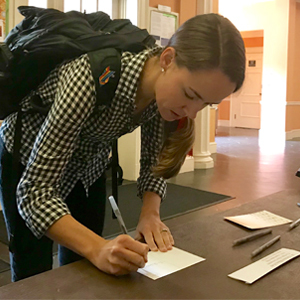PTS Students Respond to Kavanaugh Hearings, Ford’s Testimony
October 19, 2018 | Academics, Campus Life, Center for Theology, Women, and Gender, Public, Spiritual Life, Students, Women in Ministry Initiative

For weeks, our society has been inundated by coverage about the Senate Judiciary Committee hearings surrounding the questioning of Brett Kavanaugh and testimony of Christine Blasey Ford. After United States senators voted to confirm Kavanaugh as the newest member of the Supreme Court, many Princeton Theological Seminary students were left grappling with the overall process and outcome.
In response, the Seminary’s Center for Theology, Women and Gender (CTWG) coordinated two events: a write-in for doctoral students and a “thank you” message campaign where MDiv students expressed their gratitude to Ford for sharing what they viewed a courageous testimony.
Doctoral students reflect on the relevance of their work to the world around them
Before Kavanaugh’s confirmation, Leslie Virnelson, a doctoral student in Biblical Studies, organized a write-in event. Doctoral students gathered to write reflections (see below) on how their work could provide a lens for examining issues of sexual assault and women’s experiences that have gained greater attention as a result of the recent hearings.
In her reflection, Virnelson examined the rape of David’s daughter, Tamar, and explored how sexual exploitation is tied into struggles for political power, concluding that this exploitation “is a symptom of poisoned morals that are not isolated to one sector of a person or a nation’s life and conduct.”
In his work as a Religion and Society doctoral student, Kevin Vollrath says he looks to “show the unique gifts of people with developmental or intellectual disabilities.” Looking at the national conversation around women and gender through this lens, Vollrath wrote:
I also work to illuminate intersections between disability, sexism, racism, and transsexism. Sexual assault is one such intersection. According to NPR’s series on the subject, persons with intellectual disabilities are seven times more likely to be assaulted than non-disabled people. Women with intellectual disabilities are 12 times more likely than non-disabled people, based on the Bureau of Justice Statistics’ National Crime Victimization Survey.
In the national dialogue surrounding Kavanaugh’s confirmation, Biblical Studies doctoral student James Klotz also sees intersections. As a gay man, but one who is white, cis-male, and Protestant, Klotz says he seeks to be cognizant of the power and influence he has because of various identities, and to see how he can use the influence he has to support or empower others.
I realize that a significant part of my pastoral work in both pulpit and classroom is simply being there. Listening to a sermon or a lecture by someone who is openly gay and married to another man and is an ordained minister of the Word and Sacrament and specializes in the Old Testament is a novel experience for many churchgoers and first-year seminary students. Part of my own professional development as a scholar is to move beyond mere presence and to find ways that my own research and my own teaching can have an impact on the greater conversation in the church, the academy, and the world around issues of women, theology and gender.
PhD Student Reflections
- Maggie Elwell | The Stories We Tell
- Miles Hopgood | Martin Luther on the Virtues of Judges
- James Klotz | I Remember the Laughter
- Devlin McGuire | Jesus and the Woman: John 7:53-8:11 and the opening statement of Dr. Christine Blasey Ford
- Jolyon Pruszinski | The Historical Brett and the Saint Kavanaugh of Faith
- Leslie Virnelson | Reflections on 2 Sam. 13 and Webs of Violence
- Kevin Vollrath | Disability and the Kavanaugh Hearing
- Ransom Portis | Who Can Hold Judicial Authority?
Students show solidarity towards Ford
In the week after the Senate confirmed Kavanaugh, MDiv senior Emmie Arnold organized a second event—a letter writing campaign to thank and encourage Ford. For three days, Arnold sat at a table outside of the Mackay dining hall with postcards and stamps.
Arnold, who plans to work as a pediatric hospital chaplain after she graduates this spring, looks to Christ’s life and ministry for her foundation in these conversations. “In Jesus Christ, we see a clear example of God’s character, as someone who cares about the dignity of all people,” she says. “We serve a God who was willing to be with those who nobody wanted to be with, and to listen to the people who society had written off.”
Her hope is that Kavanaugh’s hearing will prompt people to examine how they may be contributing to injustice in their own environments. Arnold says, “If nothing else, being able to look at our own lives and say, ‘When did I let something slip?’”

Center for Theology, Women and Gender
“For me, this is not about the Kavanaugh hearings only,” says Maggie Elwell, co-director of CTWG. “Presbyterians think about education as a long-term solution, so I don’t just think of this as a one-and-done thing.”
Through events, speakers, and empowering student leaders, the CTWG aims to lead the community in thinking theologically about gender. Learn more about CTWG.





